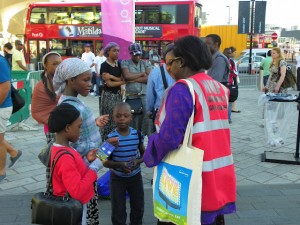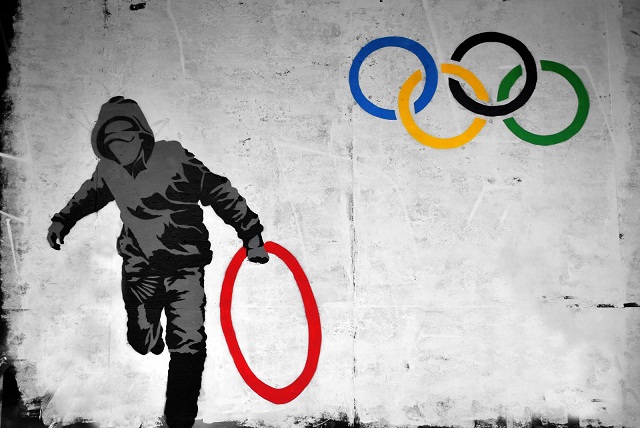London2012: Secure Olympics, Policed Communities Comment
New in Ceasefire - Posted on Saturday, August 11, 2012 19:36 - 1 Comment
“Helping young people in the area to understand that they are not defenceless in protecting themselves from police abuse, and that we all have the capacity to resist actions of officers who seemingly abuse or misinterpret their powers is a vital step in holding the state to account.” (image: blowe.org.uk)
State control has been omnipresent throughout London in the run-up to the 2012 Olympics. The voice of Mayor Boris Johnson echoed frequently around London Underground stations warning passengers to avoid certain routes: “Don’t get caught out!” he commands over the public speakers.
At Stratford, the main Olympic stadium, human shepherds wield megaphones directing people to walk on the left, take the designated staircase, leave the train a stop early or not cross the road until a chain of Olympic shepherds is broken by the emergence of the green light most of us learned about as preadolescents.
And yet, while the British state wraps tourists in cotton wool to ensure against any accidents or discomfort resulting in negative PR, the surrounding communities have had a very different experience of the state and its agents during the course of the games.
The prospect of tens of thousands of police officers, army personnel and private security contractors descending upon Newham, a borough which has historically suffered from police neglect and abuse, led to organising for defence of the area and its residents well in advance.
Newham Monitoring Project (NMP) has been campaigning and organising against state racism for over thirty years and, this summer, trained over 100 Community Legal Observers (CLO) to patrol their streets monitoring police aggression and providing the community with legal support and information.
However, the CLOs have already been banned by private security staff contracted by Newham Council from some Olympic venues for allegedly “assisting criminals”. When support for the local community is seen as facilitating crime, it is a telling indictment of the approach which private security firms are adopting towards Newham residents.
Newham Council told other CLOs that they were littering, and would have to leave. NMP were later told that corporate events, such as the Olympics, prohibit their presence. TfL has also banned CLOs from the area around their bus stations on the basis that it is private land.
 The first week of the Olympics brought allegations from members of the community about police violence and racism towards young people.
The first week of the Olympics brought allegations from members of the community about police violence and racism towards young people.
NMP will be continuing its support for any victims of these crimes beyond the Olympics of course Talking to young people on an estate late last Friday night, they were more angry than surprised at news of an attack, but felt powerless against a force which they immediately recognised as the government.
But NMP have, for years, challenged disproportionate and discriminatory policing, challenging unlawful stops, searches and arrests on the streets. Larger cases they have been involved in are assisting people reporting assault or racial abuse by police, such as the recent case of a black man alleging being strangled and being told he would “always be a nigger” by police in east London.
CLOs have also been challenging police officers ‘moving on’ homeless people who live near the Olympic site. Some officers we spoke to on a recent evening demonstrated to us how officers try to magnify their power, and misunderstand simple terms. After we asked them why they were moving on a homeless person, they took out their notebooks, and demanded our names and other details. They seemed surprised when we told we wouldn’t give our details as we didn’t have to.
When they were told that NMP exists partly due to the institutional racism in the police which was proved in the Macpherson Report, their immediate response was “Are you calling me racist?” When we explained that that isn’t what institutional racism means, they responded by assuring us that they understood fully what institutional racism means, before asking “are you calling ME institutionally racist?” This absurd statement demonstrates a lack of awareness of what institutional racism is or what actually constitutes an institution.*
Helping young people in the area to understand that they are not defenceless in protecting themselves from police abuse, and that we all have the capacity to resist actions of officers who seemingly abuse or misinterpret their powers is a vital step in holding the state to account.
The revolt against police one year ago resulted in hundreds of young people being criminalised and incarcerated by a huge shift in punitive sentencing in relation to theft, or even mere presence at the scene of a crime (or perceived crime).
Rechanneling this revolt to psychological and intellectual empowerment in the face of state repression is the most well-proven avenue towards greater freedom and justice for some of the country’s most over-policed communities.
*I guess it’s a lot easier to institutionalise a group of people who have no idea what an institution is
[The views expressed in this article are not necessarily those of Newham Monitoring Project]
1 Comment
Nancy



Regrettably “the more things change the more they remain the same”. The fact that the CLO’s role is not welcomed says a lot about the education system, and the desire of some institutions to condone and perpetuate bad attitudes.